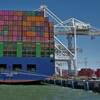NRF Urges President to Intervene in Port Negotiations
NRF: East and Gulf Coast Strike Would Have Devastating Implications for the Retail Industry.
The National Retail Federation today sent a letter to President Obama to express the retail industry’s growing concern if a contract agreement isn’t reached between the International Longshoremen’s Association and the United States Maritime Alliance, Ltd. The two sides have been in negotiations, with the assistance of federal mediators, for the past few months with little demonstrable progress. The concern for a coast-wide strike is ever increasing.
While another round of talks is scheduled for this week, the contract deadline – December 29 – is quickly approaching. If the sides fail to extend the negotiations or reach an agreement, a port strike impacting 15 container ports along the East and Gulf Coast is highly probable. A strike at these ports has not occurred since 1977.
“A strike of any kind at ports along the East and Gulf Coast could prove devastating for the U.S. economy,” NRF President and CEO Matthew Shay wrote to the president. “We call upon you to use all means necessary, including Taft-Hartley, to keep the two sides at the negotiating table and head off a coast-wide strike.”
Any supply chain disruption at the ports would immediately impact every importer and exporter – potentially disrupting or delaying spring and summer retail merchandise – that utilizes the facilities along the East and Gulf Coasts from Boston to Houston. If a strike or lockout occurs, 15 separate container ports – Boston, New York/New Jersey, Delaware River, Baltimore, Hampton Roads, Wilmington, Charleston, Savannah, Jacksonville, Port Everglades, Miami, Tampa, Mobile, New Orleans, and Houston – would immediately cease operations.
“We cannot afford further supply chain disruptions as we enter 2013,” Shay said. “The two sides must remain at the negotiating table until a deal is reached.”
If a strike or lockout occurs, the president could utilize the Taft-Hartley Act to end the job action and force the two sides back to the negotiating table. The last time the Act, which seeks to protect the free flow of commerce, was invoked was by President George W. Bush during the 2002 West Coast ports lockout. Economists estimate that the ‘02 10-day lockout cost the U.S. economy $1 billion a day and took more than six months for the supply chain to recover.
“Allowing a strike to occur for even one day could have a negative impact on all of those downstream businesses and employees who rely on the ports,” Shay said. “The U.S. economy cannot afford to wait for a strike to occur before we see administration action. We urge you to get engaged now with these parties to ensure a strike does not occur.”
As the world’s largest retail trade association and the voice of retail worldwide, NRF represents retailers of all types and sizes, including chain restaurants and industry partners, from the United States and more than 45 countries abroad. Retailers operate more than 3.6 million U.S. establishments that support one in four U.S. jobs – 42 million working Americans. Contributing $2.5 trillion to annual GDP, retail is a daily barometer for the nation’s economy. NRF’s Retail Means Jobs campaign emphasizes the economic importance of retail and encourages policymakers to support a Jobs, Innovation and Consumer Value Agenda aimed at boosting economic growth and job creation. www.nrf.com













